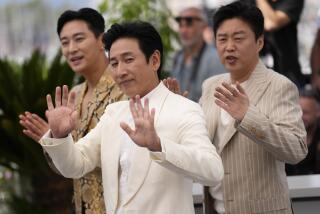Iraqi Mosques Flex Election Muscle
Baghdad’s Bratha Mosque on Friday had the atmosphere of a politicized revival tent.
Election posters blanketed the concrete blast walls outside the Shiite Muslim house of worship, a stronghold of the Supreme Council for Islamic Revolution in Iraq, or SCIRI. Inside the prayer hall, young boys handed out literature for the United Iraqi Alliance, in which SCIRI is a main partner. Banners and fliers bore the alliance’s candle icon and its electoral slate number: 555.
Less than two weeks before Iraq’s third national vote in a year, the nation’s mosques are serving as political pulpits. On Friday, the Muslim holy day, Shiite and Sunni imams openly added election talk to their weekly dose of religion -- from general homilies on the virtues of political participation to partisan endorsements of specific slates in the Dec. 15 parliamentary vote.
In a deeply religious country where sectarian identity trumps most other considerations, mosques are expected to play a pivotal role in politics. Shiite Muslim politicians, who rode their religious credentials to victory 11 months ago, find themselves competing against a newly engaged and active Sunni Muslim bloc with its own network of influential mosques.
Sunnis, many of whom feel disenfranchised after Saddam Hussein’s ouster, mostly boycotted the parliamentary elections in January, and their ranks continue to fuel the insurgency.
Imam Jalaluddin Saghir of the Shiite Bratha Mosque, who is also a United Iraqi Alliance legislator, spent the first half of his Friday sermon on esoteric religious matters.
Then he attacked former interim Prime Minister Iyad Allawi, a secular Shiite, for recent comments that human rights abuses under the United Iraqi Alliance-led government were worse than under Hussein. He also noted that Allawi’s defense minister was a central figure in a corruption scandal.
In January’s vote, the United Iraqi Alliance had a virtual monopoly on mosque politics thanks to the boycott by Sunni groups, including the Iraqi Islamic Party.
The United Iraqi Alliance, which had the tacit backing of Grand Ayatollah Ali Sistani -- whose word is law for many Iraqi Shiites -- sold the idea that voting was a religious duty. Kurds, who are mostly Sunni, marshaled their voters around ethnic identity rather than religion.
This time the Iraqi Islamic Party has deployed its own network of influential imams to rally support for its Iraqi Accord coalition, whose slate number is 618.
At Al Mokhtar Mosque in Sunni-dominated Samarra, Imam Islam Fluah began on a nonpartisan note Friday but soon endorsed a slate.
“I want you to choose your own judgment in voting, but be sure to pick the cleanest slate and remember that it’s a religious duty to participate in the elections,” he said. “By the way slate 618, the Iraqi Accord slate, has the cleanest and most honest people with pure hands that will guarantee a united independent Iraq for us.”
In Najaf, Imam Sadruddin Qubanchi cast the parties in sectarian terms, characterizing the Iraqi Islamic Party as a repackaged version of the Sunni-dominated Baath Party that held sway during Hussein’s rule.
“The electoral competition in Iraq is a political one between the deprived people and the ones who deprived them in the past,” said Qubanchi, who is affiliated with SCIRI. “The leadership of the Baath are embarrassed to say that they are the Baath Party. Instead they say that we are the Iraqi Islamic Party.”
In a comment sure to inflame Sunni passions, Qubanchi openly lobbied for continued Shiite dominance of the government. “The Shiites are the majority, so they must take the majority in all the ministries,” he said.
However, the United Iraqi Alliance will be hard put to re-create its January performance. Several prominent secular Shiites, including Ahmad Chalabi, have left the coalition.
What remains is more of a narrowly focused conservative religious organization built around SCIRI, Prime Minister Ibrahim Jafari’s Dawa Party and loyalists of populist radical cleric Muqtada Sadr.
The United Iraqi Alliance must also manage with a lesser level of support from Sistani. The reclusive cleric never formally endorsed the alliance in January, but he helped oversee its creation and allowed it to openly use his image on campaign posters and claim his backing.
But Sistani’s associates say his support for the United Iraqi Alliance was focused solely on achieving a strong Shiite voice in the drafting of Iraq’s new constitution. With the draft charter completed and approved in an October referendum, Sistani has said that he has no preferences in the upcoming vote.
“But that doesn’t stop alliance cadres on the ground from trying to give the appearance” of Sistani’s support, said an official with a U.S.-based group working with political parties here.
The official, speaking on condition that neither she nor her organization be named, said United Iraqi Alliance politicians and preachers had been treading a careful line, placing Sistani’s image on campaign materials but not directly saying that he backed them.
“”Their message is basically, ‘No, really. Sistani wants you to vote for us even if he doesn’t say it.’ ”
Times staff writer Raheem Salman in Baghdad and special correspondents Zaydan Khalaf in Samarra and Saad Fakhrildeen in Najaf contributed to this report.
More to Read
Start your day right
Sign up for Essential California for news, features and recommendations from the L.A. Times and beyond in your inbox six days a week.
You may occasionally receive promotional content from the Los Angeles Times.






